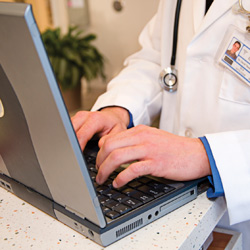Intersecting Healthcare and the Internet

A recent survey from the Pew Foundation reveals the extent to which social networking and the Internet have become part of our daily lives. According to that survey, three-quarters of the U.S. adult population are online, and most of them use the Internet to find health information.
It’s for this reason and others that Methodist Medical Center has sought to be an industry leader in the social media arena, as well as electronic medical records, electronic prescriptions and other advances in healthcare information technology (IT).
Methodist was recently recognized as a “Most Wired Hospital,” according to the results of the 2011 Most Wired Survey released by Hospitals & Health Networks magazine. As a field, hospitals are focused on expanding and adopting certain kinds of information technology, such as computerized physician order entry, to promote improved patient care and data collection. “Most Wired” hospitals have made great strides in this area.
“Our efficiencies, quality measures, safety and patient satisfaction scores all reflect the positive impact that automation has had at Methodist,” said Steven Riney, vice president and chief information officer. “We are very data-driven. Automation has enabled us to make major improvements in safety, service and clinical outcomes for our patients.”
“Independent assessments demonstrate that Methodist not only leads the local market, but we also lead on a national basis,” said Deborah R. Simon, interim president and CEO for Methodist. “Our designation as a 2011 Most Wired Hospital confirms that. Fewer than 150 of the almost 6,000 hospitals in the U.S. were recognized for this achievement.”
In addition to internal applications for advanced information technology, the whole realm of social media has been added to the resources available to customers of healthcare and health information. A quick Google search will yield multiple Facebook pages dealing with medical information and conditions. Many healthcare organizations, including Methodist, have Facebook pages. Search pretty much any disease on YouTube, and you’re bound to find a video on the topic. The same is true of Twitter and other social media sites.
Methodist connects with online users via MyMethodist.net, providing information on its services and physicians, and giving patients tools to help them manage their health. The website’s chat feature lets users pose questions in real time to nurses and the webmaster. People can find a new doctor or even a job using this feature!
Methodist Medical Group doctors offer MyMethodist eHealth, which allows patients to create a personal health record, send their doctor’s office a message, and even have a convenient web visit with their physician. Another way for the public to ask doctors a question is the “Ask the Expert” feature on MyMethodist.net and its Facebook page. Doctors also provide health information on the Methodist Physicians blog (blogs.mymethodist.net).
On Facebook and Twitter, Methodist offers wellness tips, news about the organization and useful links. Its web team also interacts with “fans” on Facebook and answers questions on a daily basis.
While the Internet is having a significant impact on health and healthcare, there is still great potential to improve the effective and efficient delivery of healthcare, as well as empower and educate consumers. iBi

